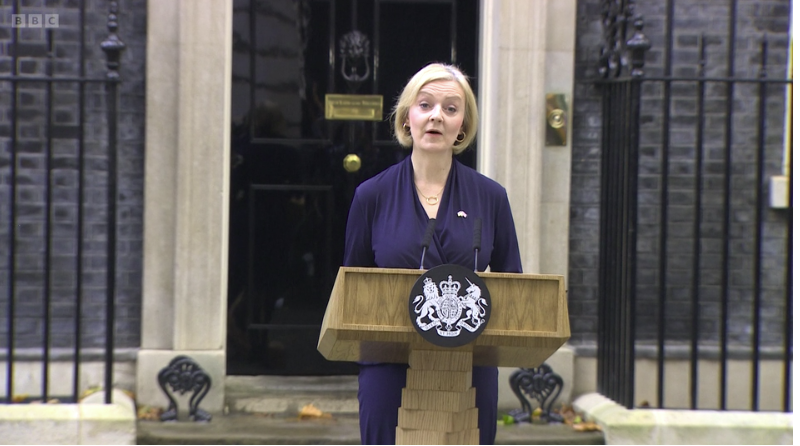Liz Truss exit sets off another Tory leadership race
By Joshua Nevett From BBC Politics

Liz Truss has resigned as prime minister after 45 days in office marked by turmoil, triggering the second Tory leadership election in four months.
Ms Truss said her successor would be elected by next week after a rebellion by Tory MPs forced her to quit.
Chancellor Jeremy Hunt said he would not run in the contest but other senior Tories are considering bids.
Tory MPs revolted against Ms Truss after a series of U-turns on her economic plan sapped her of authority.
In a brief speech outside Downing Street, Ms Truss said the Conservative Party had elected her on a mandate to cut taxes and boost economic growth.
But given the situation, Ms Truss said: “I recognise that I cannot deliver the mandate on which I was elected by the Conservative Party.”
Labour leader Sir Keir Starmer and other opposition parties called for an immediate general election following Ms Truss’s resignation speech.
Ms Truss said she would remain in post until a successor formally takes over as party leader and is appointed prime minister by King Charles III.
Mr Hunt – who was appointed chancellor last week – has said he will not stand in the leadership contest to be the next prime minister, but none of the candidates who stood against Ms Truss in the previous contest have indicated whether they’ll be standing.
Sir Graham Brady, the chairman of the 1922 backbench committee of Conservative MPs, said it would be possible to conclude a leadership ballot by Friday next week.
He said he expected Conservative members to be given a say on who succeeds Ms Truss, but would set out further details later.
Ms Truss will become the shortest-serving PM in British history when she stands down.
In her speech, Ms Truss said she entered “office at a time of great economic and international instability”, as war rages in Ukraine and living costs skyrocket.
The prime minister said her government delivered on providing support for energy bills and reversing a rise in National Insurance, a tax on workers and companies.
But Ms Truss’s resignation comes after a period of political and economic turbulence, which forced her government to ditch tax cuts that sent financial markets into a tailspin.
The prime minister sacked close political ally Kwasi Kwarteng as chancellor and appointed Mr Hunt as his successor as she attempted to calm the markets.
At Prime Minister’s Questions on Wednesday, Ms Truss insisted she was a “fighter, not a quitter” after Labour’s leader asked her why she had not resigned.
But more instability followed, when Suella Braverman quit as home secretary and a vote on fracking fell into disarray, with some Tory MPs accused of bullying.
For more on this story and video go to BBC




